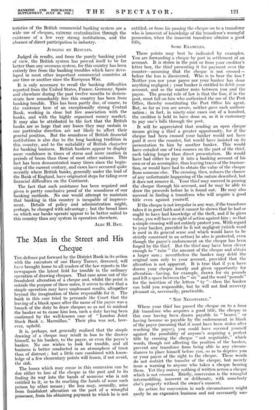SOME EXAMPLES.
These points may best be indicated by examples. You are forwarding a cheque by post in settlement of an account. It is stolen in the post or from your creditor's leiter box, the thief presenting it for payment over the counter—assuming that the cheque is not crossed— before the loss is discovered. Who is to bear the loss ? Neither you nor your payee nor your banker has done anything negligent ; your banker is entitled to debit your account, and so the matter rests between you and the • payee. The general rule of law is that the loss, if in the post, must fall on him who authorized the use of the Post Office, thereby constituting the Post Office his agent. But, so far as you are aware, neither gave such authori- zation • in fact, in ninety-nine cases out of a hundred, the creditor is held to have done so, as it is customary to pay one's bills through the post.
It will be appreciated that sending an open cheque Means giving a thief a greater opportunity, for if the checiue had been crossed your banker would not have paid it over the counter, but would have insisted on its presentation to him by another banker. This would have entailed one of two courses on the part of the thief, each taking longer than direct presentation. He .would have had either to pay it into a banking account of his own or of an accomplice, thus leaving traces of the transac- tion, or would have had to obtain the value of the cheque from someone else. The crossing, then, reduces the chance of any unfortunate happening of the nature described, but it does not remove it. Your thief may succeed in passing the cheque through his account, and he may be able to draw the proceeds before he is found out. He -a may succeed in finding a traniferee Who Will acquire good title even against yourself. • If the cheque is not irregular in any way, if the transferee takes it in good faith and it cannot be shown that he had or ought to have had knowledge of the theft, and if he gives value, you will have no right of action against him • so that a simple crossing will not entirely protect you. With regard to your banker, provided he is not negligent .(which word is used in its general sense and which would have to be strictly construed in an action) he also is protected, even though the payee's endorsement on the cheque has been forged by the thief. But the thief may have been clever enough to " raise " the amount of the cheque and obtain a larger sum ; nevertheless the banker may debit the original sum only to your account, provided that the alteration is not apparent. It is true that if yc u have drawn your cheque loosely and given opportunity for alteration—having, for example, drawn for six pounds and left a space between the " six " and the word "pounds" for the insertion of the letters " ty "—then the banker can hold you responsible, but he will not find recovery pleasant or, necessarily, practicable.










































 Previous page
Previous page